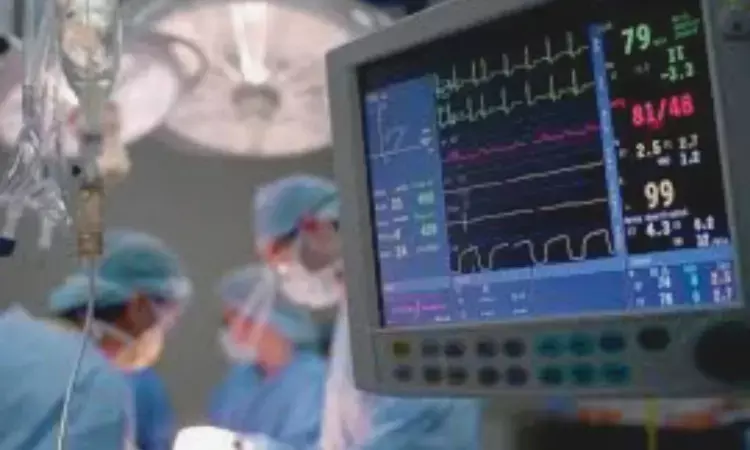- Home
- Medical news & Guidelines
- Anesthesiology
- Cardiology and CTVS
- Critical Care
- Dentistry
- Dermatology
- Diabetes and Endocrinology
- ENT
- Gastroenterology
- Medicine
- Nephrology
- Neurology
- Obstretics-Gynaecology
- Oncology
- Ophthalmology
- Orthopaedics
- Pediatrics-Neonatology
- Psychiatry
- Pulmonology
- Radiology
- Surgery
- Urology
- Laboratory Medicine
- Diet
- Nursing
- Paramedical
- Physiotherapy
- Health news
- Fact Check
- Bone Health Fact Check
- Brain Health Fact Check
- Cancer Related Fact Check
- Child Care Fact Check
- Dental and oral health fact check
- Diabetes and metabolic health fact check
- Diet and Nutrition Fact Check
- Eye and ENT Care Fact Check
- Fitness fact check
- Gut health fact check
- Heart health fact check
- Kidney health fact check
- Medical education fact check
- Men's health fact check
- Respiratory fact check
- Skin and hair care fact check
- Vaccine and Immunization fact check
- Women's health fact check
- AYUSH
- State News
- Andaman and Nicobar Islands
- Andhra Pradesh
- Arunachal Pradesh
- Assam
- Bihar
- Chandigarh
- Chattisgarh
- Dadra and Nagar Haveli
- Daman and Diu
- Delhi
- Goa
- Gujarat
- Haryana
- Himachal Pradesh
- Jammu & Kashmir
- Jharkhand
- Karnataka
- Kerala
- Ladakh
- Lakshadweep
- Madhya Pradesh
- Maharashtra
- Manipur
- Meghalaya
- Mizoram
- Nagaland
- Odisha
- Puducherry
- Punjab
- Rajasthan
- Sikkim
- Tamil Nadu
- Telangana
- Tripura
- Uttar Pradesh
- Uttrakhand
- West Bengal
- Medical Education
- Industry
Risk of sudden death, resuscitated cardiac arrest highest in first month following acute MI, reveals JAMA study

RPGMC-Tanda’s Road to PGIMER
A new study published in the Journal of American Medical Association suggests that the risk of sudden death or resuscitated cardiac arrest (RCA) following an acute myocardial infarction (AMI) peaked in the first month and then quickly decreased.
The patients with pulmonary congestion and/or left ventricular dysfunction following an acute myocardial infarction were recruited for the Valsartan in Acute Myocardial Infarction (VALIANT) and Prospective ARNi vs. ACE Inhibitor Trial to Determine Superiority in Reducing Heart Failure Events After MI (PARADISE-MI) studies. In order to compare the rates of sudden death and resuscitated cardiac arrest following AMI in the PARADISE-MI and VALIANT trials, James Curtain and colleagues undertook this study.
The PARADISE-MI experiment enrolled participants between December 2016 and March 2020, while the VALIANT trial enrolled participants between December 1998 and June 2001. In the VALIANT and PARADISE-MI trials, the median follow-up was 22 months, while it was 24.7 months in the former. The research included individuals with AMI who were further affected by left ventricular failure or pulmonary congestion.
In the VALIANT trial enrolled 14,703 patients overall, the cohort was further refined to a subgroup that mirrored the risk profile of patients in the PARADISE-MI trial which was characterized by at least one augmenting risk factor and no prior history of heart failure. This subgroup comprised of 9,617 patients and reported a 7.4% incidence of sudden death or RCA. In contrast, the PARADISE-MI trial included 5,661 patients and showed a substantially lower incidence of 2.6%.
The analysis highlighted a particularly vulnerable period immediately following AMI, with sudden death rates peaking within the first month. Specifically, the rate of sudden death was 19.3 per 100 person-years in the VALIANT trial when compared to 9.5 per 100 person-years in the PARADISE-MI trial. These rates subsequently declined, illustrating the critical need for intensive early intervention post-AMI.
The reduction in sudden death rates in the PARADISE-MI trial can be attributed to several factors associated with contemporary management practices. The patients in the PARADISE-MI cohort were more frequently treated with percutaneous coronary intervention (PCI) for their initial AMI, a procedure that opens blocked coronary arteries and restores blood flow to the heart. Additionally, the use of β-blockers, statins, and mineralocorticoid receptor antagonists was more common in the PARADISE-MI cohort when compared to the VALIANT cohort. Overall, the risk of sudden death/RCA in patients with a decreased left ventricular ejection fraction and/or pulmonary congestion was shown to be 2 to 3 times lower in the individuals getting contemporary care when compared to their counterparts from two decades ago.
Reference:
Curtain, J. P., Pfeffer, M. A., Braunwald, E., Claggett, B. L., Granger, C. B., Køber, L., Lewis, E. F., Maggioni, A. P., Mann, D. L., Rouleau, J. L., Solomon, S. D., Steg, P. G., Finn, P. V., Fernandez, A., Jering, K. S., & McMurray, J. J. V. (2024). Rates of Sudden Death After Myocardial Infarction—Insights From the VALIANT and PARADISE-MI Trials. In JAMA Cardiology. American Medical Association (AMA). https://doi.org/10.1001/jamacardio.2024.2356
Neuroscience Masters graduate
Jacinthlyn Sylvia, a Neuroscience Master's graduate from Chennai has worked extensively in deciphering the neurobiology of cognition and motor control in aging. She also has spread-out exposure to Neurosurgery from her Bachelor’s. She is currently involved in active Neuro-Oncology research. She is an upcoming neuroscientist with a fiery passion for writing. Her news cover at Medical Dialogues feature recent discoveries and updates from the healthcare and biomedical research fields. She can be reached at editorial@medicaldialogues.in
Dr Kamal Kant Kohli-MBBS, DTCD- a chest specialist with more than 30 years of practice and a flair for writing clinical articles, Dr Kamal Kant Kohli joined Medical Dialogues as a Chief Editor of Medical News. Besides writing articles, as an editor, he proofreads and verifies all the medical content published on Medical Dialogues including those coming from journals, studies,medical conferences,guidelines etc. Email: drkohli@medicaldialogues.in. Contact no. 011-43720751


